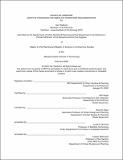Granular urbanism : adaptive strategies for obsolete downtown neighborhoods
Author(s)
Titelboim, Yair(Yair Yakov)
Download1237269528-MIT.pdf (53.46Mb)
Alternative title
Adaptive strategies for obsolete downtown neighborhoods
Other Contributors
Massachusetts Institute of Technology. Department of Urban Studies and Planning.
Massachusetts Institute of Technology. Department of Architecture.
Advisor
Rafi Segal and Brent D. Ryan.
Terms of use
Metadata
Show full item recordAbstract
Tackling the problem of obsolescence in North American cities, this thesis interrogates the question of how we should plan for the regeneration of aging office buildings. I argue that current whole-building, coarse-grained office-to-residential conversion results in entire urban neighborhoods turning into "sanitized vertical suburbia" (Moss 2017) that fail to create balanced, affordable, and inclusive communities. In response, this thesis offers a new floor-by-floor "fine-grained" (Lynch 1981) framework for space conversion. As a case study, I look at conversions In Manhattan's busy financial district that have created an instant elite neighborhood, with 10,000 new luxury units developed over the past fifteen years. To address hyper-gentrification generated by current conversion methods, I introduce a 3D Design and Data Toolkit (DDT) that redefines the conversion process and offers a selective, floor-by-floor approach to balance the quantity and mix of new residential units with the quality of urban life. This tool helps city planners, urban designers, and developers identify spaces for conversion and match demand and supply across scales. As such, this work offers a strategic, multi-scaled approach aimed at reducing grain, increasing market potential, and reinforcing urban vitality in a new conversion process.
Description
Thesis: M.C.P., Massachusetts Institute of Technology, Department of Urban Studies and Planning, February, 2020 Thesis: S.M. in Architecture Studies, Massachusetts Institute of Technology, Department of Architecture, February, 2020 Cataloged from student-submitted PDF of thesis. Includes bibliographical references (pages 214-223).
Date issued
2020Department
Massachusetts Institute of Technology. Department of Urban Studies and Planning; Massachusetts Institute of Technology. Department of ArchitecturePublisher
Massachusetts Institute of Technology
Keywords
Urban Studies and Planning., Architecture.